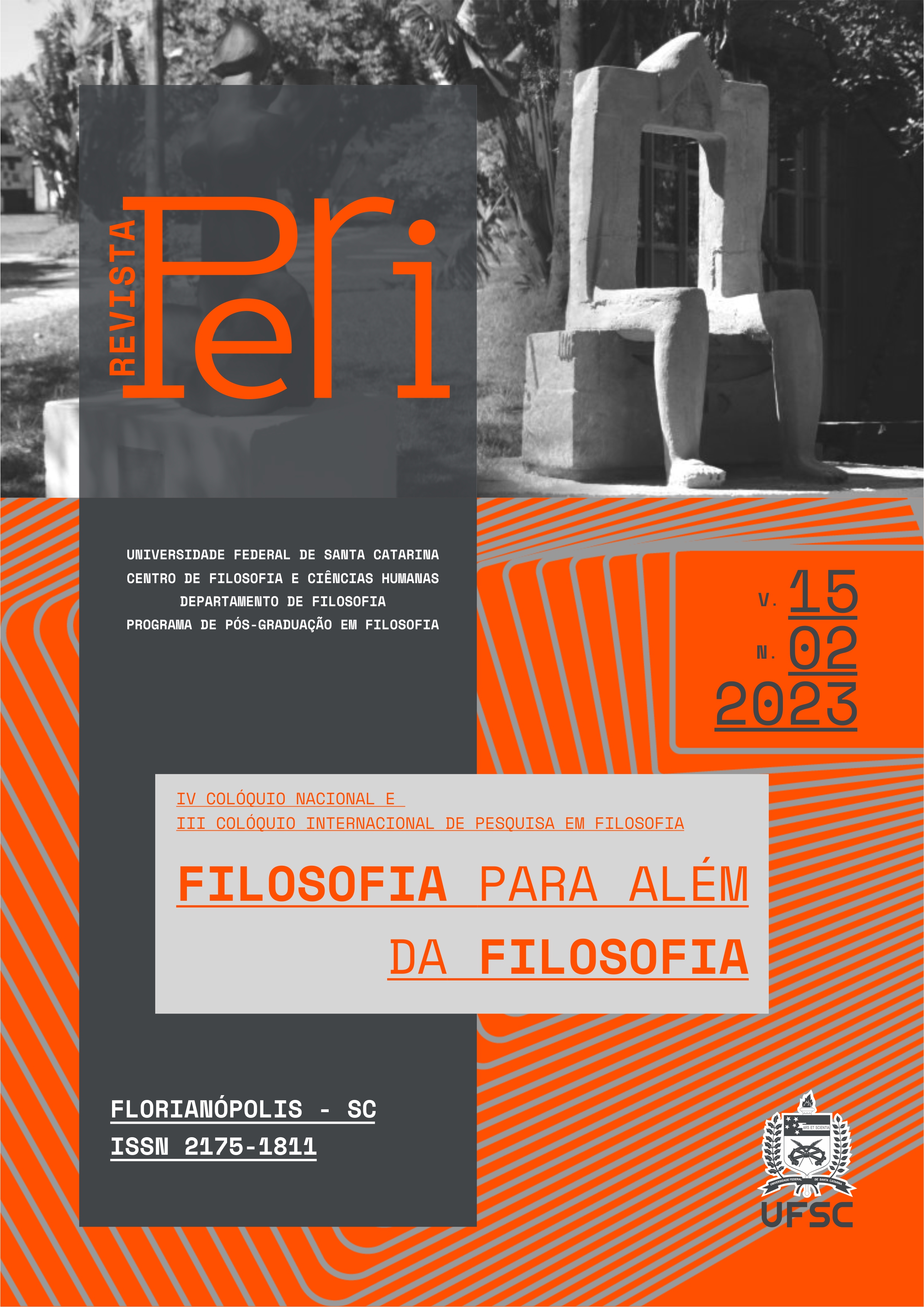Figuras literárias e reflexão ético-política no século XVIII
Palavras-chave:
Iluminismo, alteridade, filosofia, literaturaResumo
Este artigo busca apresentar a intersecção entre elementos literários e filosóficos na reflexão iluminista francesa, a partir do modo como a figura do outro, por exemplo, o estrangeiro, o selvagem, e o extraterrestre, pode ser empregada como elemento reflexivo. A intenção desse tipo de reflexão não envolve um olhar de tipo antropológico que buscaria um melhor entendimento da figura do outro, participante de outra cultura ou mesmo de outro planeta, mas antes de contraponto para a percepção de si. A literatura oferece uma abertura de tipo ficcional muito explorada para que uma tese filosófica fosse colocada em perspectiva. Desse modo, Montesquieu emprega a figura do estrangeiro para uma tomada de distância em relação aos costumes parisienses. Diderot se vale da figura do chamado “selvagem” para uma tomada de distância mais intensa em relação aos costumes europeus e, por sua vez, Voltaire, oferece um retrato ficcional de um extraterrestre para efetuar uma crítica à filosofia do seu tempo. Qual é o papel do outro nesses textos, que tipo de reflexão é realizada a partir desses recursos literários?
Referências
CHAMAYOU, Anne. Les Lettres persanes ou l’esprit des livres. L’esprit créateur, v, 40, . 4, p. 13-24, 2000.
D’ALEMBERT, Jean Le Rond. Éloge à Montesquieu. In: ______. Lettres persanes. Paris: P. Pourrat Frères, p. I-XXXIX 1831.
DARNTON, Robert. The forbidden bestsellers of prerevolutionary France. Bulletin of the American Academy of Arts and Sciences, vol. 43, n. 1, p. 17-45, 1989.
DIDEROT, Denis. Entretiens sur le Fils naturel; De la poésie dramatique; Paradoxe sur le comédien. Paris: Flammarion, 2005.
______. Essais sur la peinture. Paris: Hermann, 2007.
______. Jacques le fataliste et son maître. Paris: Éditions Gallimard, 1973.
______. La religieuse. Paris: Flammarion, 2009.
______. Supplément au voyage de Bougainville. In: ______. Œuvres. Contes. Paris: Robert Laffont, 1994.
LEBRUN, Gérard. O cego e o filósofo ou o nascimento da Antropologia. Discurso, v. 3, . 3, p. 127-140, 1972.
LÉVI-STRAUSS, Claude. Jean-Jacques Rousseau, fundador das ciências do homem. In: ______. Antropologia estrutural dois. Tradução Beatriz Perrone-Moisés, São Paulo: CosacNaify, 2013.
LOCKE, John. Ensaio sobre o entendimento humano. Tradução: Anoar Aiex. São Paulo: Abril Cultural, 1999.
MONTESQUIEU, Charles-Louis de Secondat. Lettres persanes. Prefácio de Jacques Roger. Paris: Flammarion, 1964.
ROUSSEAU, Jean-Jacques. Œuvres complètes. Cinco Tomos. Paris: Pléiade, 1959-1995.
SEDAINE, Michel-Jean. Le philosophe sans le savoir. Paris: C. Hérissant, 1766.
STENGER, Gerhardt. La méthode de Voltaire: du "Traité de métaphysique" au "Philosophe ignorant". In: BACH, Reinhard; DESNÉ, Roland; HAßLER, Gerda (Ed.). Expressions des Lumières et de leur réception, 1999. p. 505-516. Disponível em: <https://shs.hal.science/halshs-03941985/document>. Acesso em: 04/05/2023.
STAROBINSKI, Jean. As máscaras da civilização. Tradução: Maria Lucia Machado. São Paulo: Companhia das letras, 2001.
SOUZA, Maria das Graças. Voltaire: a razão militante. São Paulo: Moderna, 1993.
______. Voltaire e o materialismo do século XVIII. Dissertação de mestrado. Departamento de Filosofia da Universidade de São Paulo, São Paulo, 1983.
TODOROV, Tzevetan. Nous et les autres. La réflexion française sur la diversité humaine. Paris: Édition du Seuil, 1989.
VOLTAIRE. Elementos da filosofia de Newton. Trad. Maria das Graças de Souza. São Paulo: Unesp, 2015.
______. Micromégas. In: ______. Romans et contes. Paris: Flammarion, 1966.
______. Tratado de metafísica. In: ______. Filósofo ignorante. Tradução: Antônio de Pádua Danesi. São Paulo: Martins Fontes, 2001.
Downloads
Publicado
Edição
Seção
Licença
Copyright (c) 2023 Rafael de Araújo e Viana Leite

Este trabalho está licenciado sob uma licença Creative Commons Attribution-NonCommercial-ShareAlike 4.0 International License.
1. Autores mantém os direitos autorais e concedem à revista o direito de primeira publicação, com o trabalho simultaneamente licenciado sob a Creative Commons Attribution License que permite o compartilhamento do trabalho com reconhecimento da autoria do trabalho e publicação inicial nesta revista.
2. Autores têm autorização para assumir contratos adicionais separadamente, para distribuição não-exclusiva da versão do trabalho publicada nesta revista (ex.: publicar em repositório institucional ou como capítulo de livro), com reconhecimento de autoria e publicação inicial nesta revista.
3. Autores têm permissão e são estimulados a publicar e distribuir seu trabalho online (ex.: em repositórios institucionais ou na sua página pessoal) a qualquer ponto antes ou durante o processo editorial, já que isso pode gerar alterações produtivas, bem como aumentar o impacto e a citação do trabalho publicado (Veja O Efeito do Acesso Livre).


